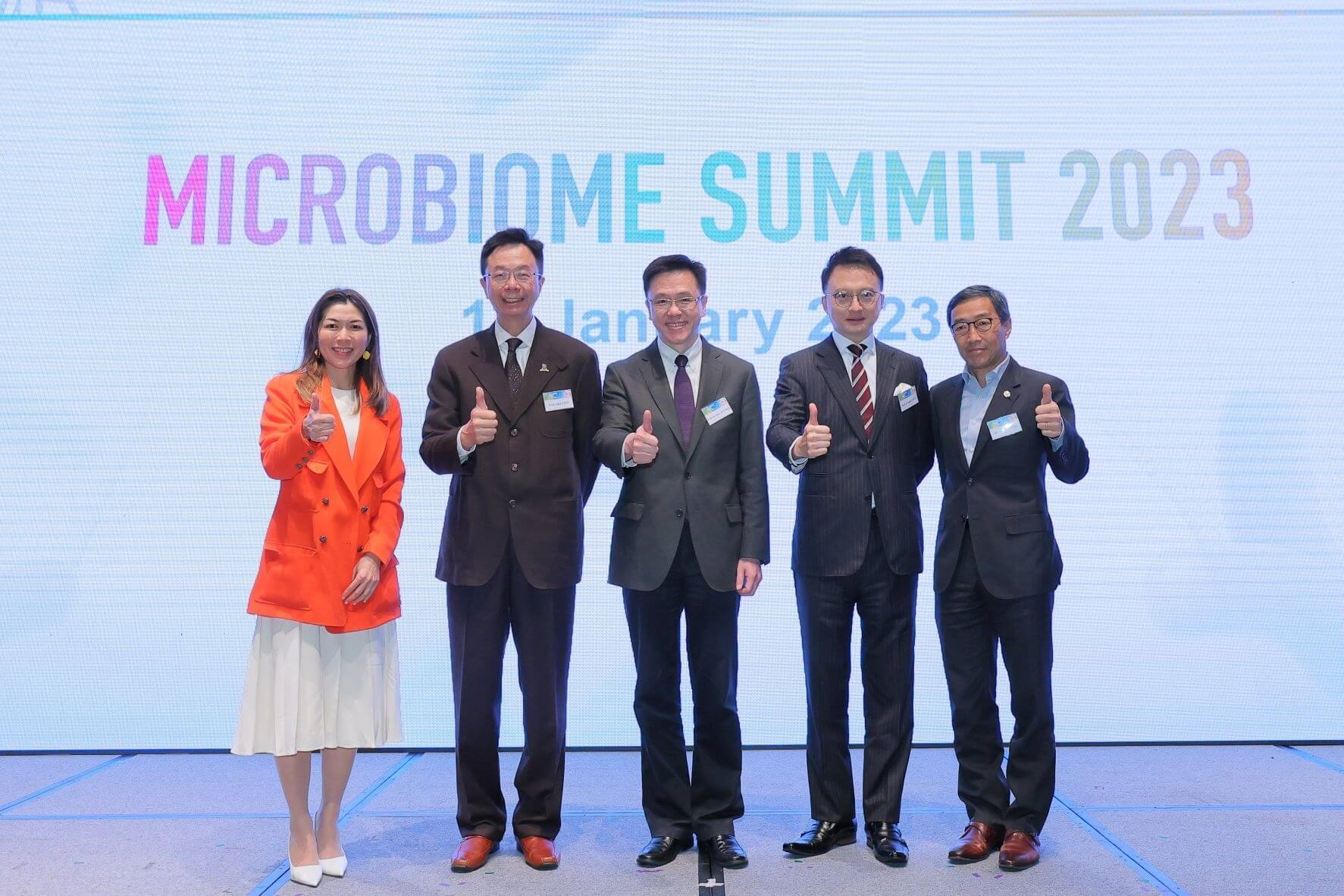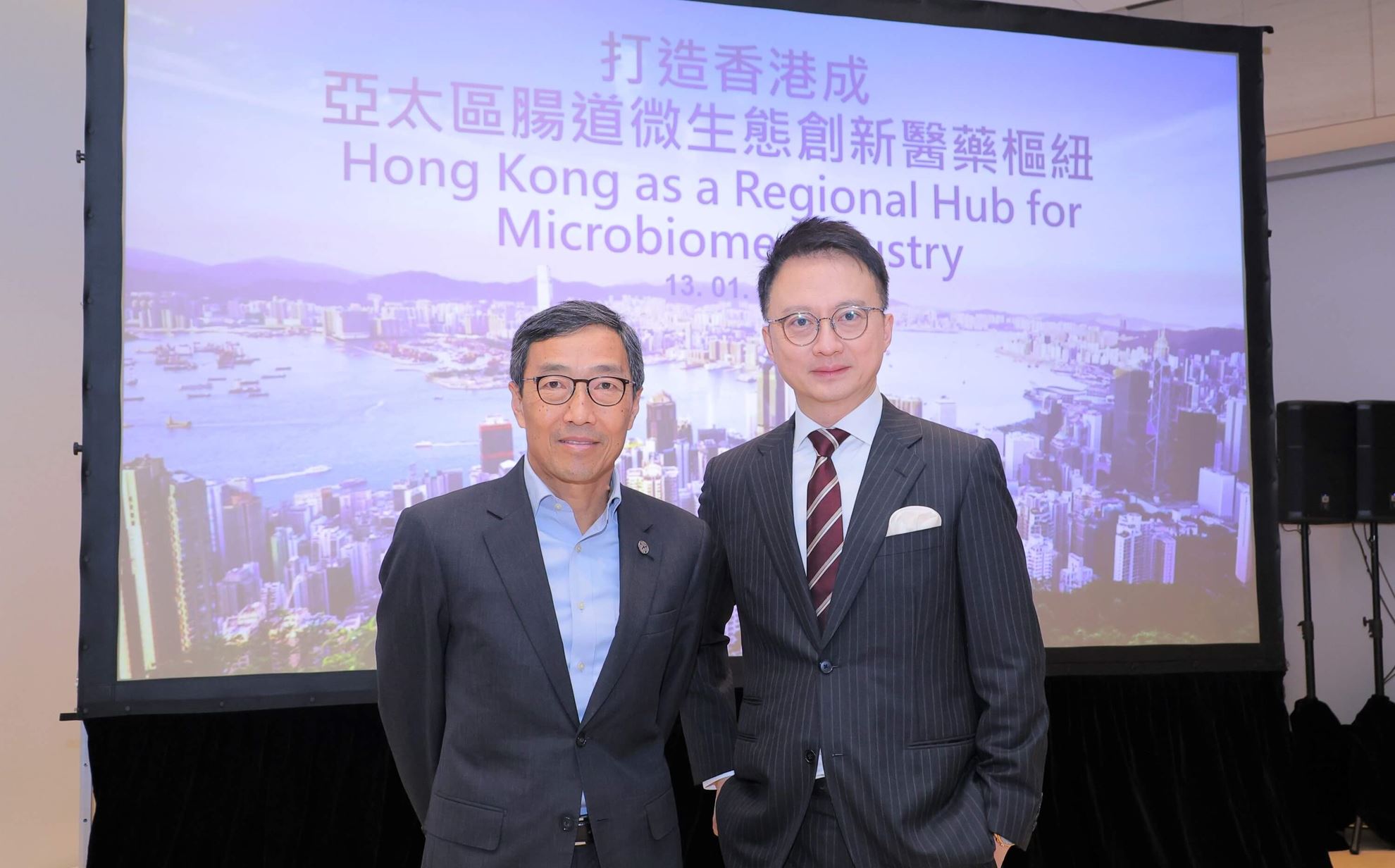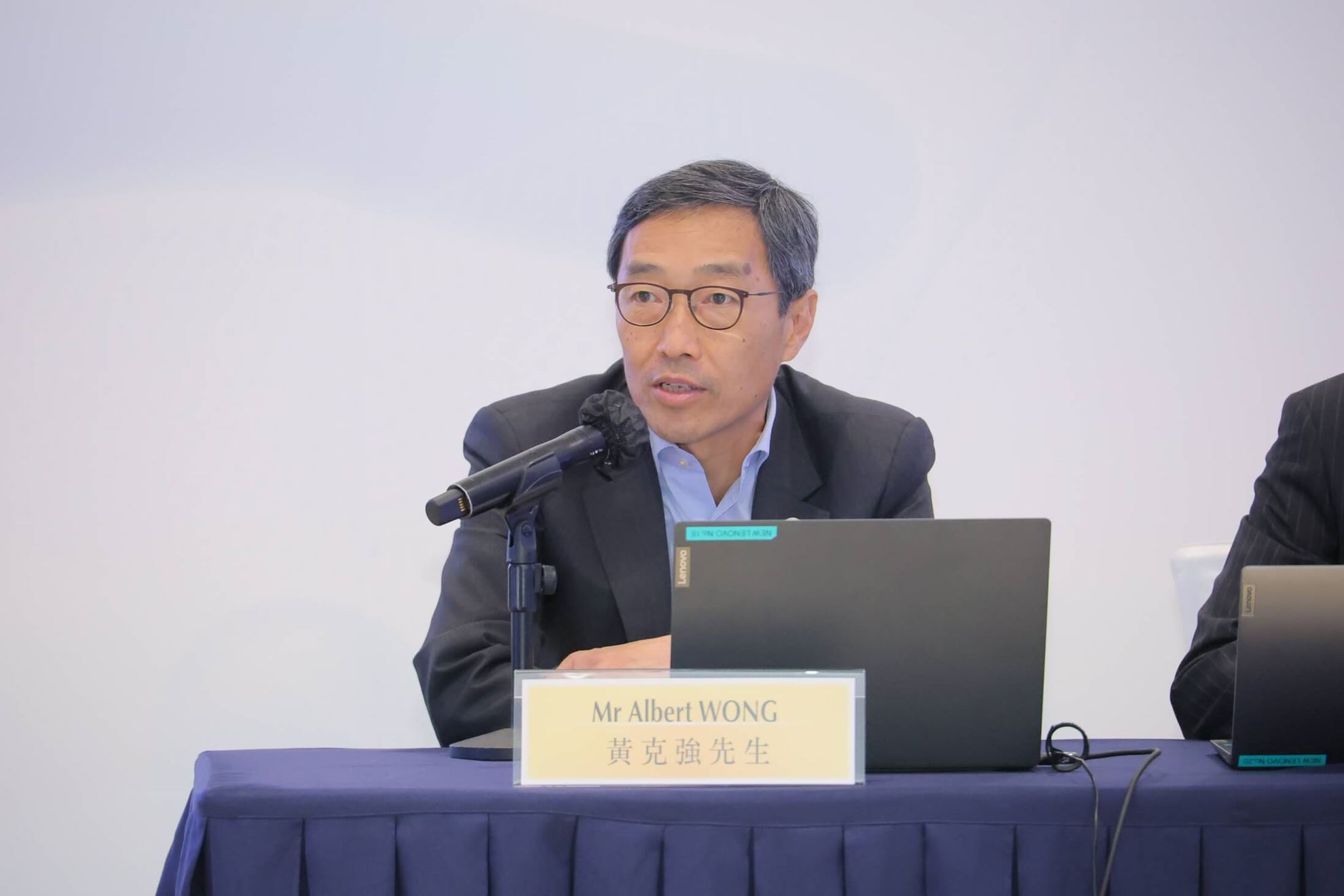13 Jan 2023
CU Medicine, MagIC and HKSTP join hands to organise the Microbiome Summit 2023 “Hong Kong as a regional hub for Microbiome Industry”


(From left) Featured are officiating guests of the Microbiome Summit 2023: Prof Siew Ng, Director of MagIC; Prof John Chai, Chairman of the CUHK Council; Prof Sun Dong, Secretary for Innovation, Technology and Industry; Prof Francis Chan, Dean of CU Medicine; and Mr Albert Wong, CEO of HKSTP.

The Microbiome Summit 2023 attracts over 400 participants across the globe.

CU Medicine, Microbiota I-Center (MagIC), and Hong Kong Science and Technology Parks Corporation (HKSTP) joined hands to host the Microbiome Summit 2023, highlighted the applications of the gut microbiome and discussed the potential of Hong Kong as an innovation and technology hub for the microbiome industry in the Asia-Pacific region.
(From left) Mr Albert Wong, CEO of HKSTP; and Prof Francis Chan, Dean of CU Medicine.

Prof Francis Chan states that the microbiome market is expected to grow at a compound annual growth rate (CAGR) of 30 to 40 percent per year. He urges the government to streamline the regulatory approval of Hong Kong’s innovations in the Greater Bay Area. Specifically, he advocates the establishment of a regional medical products administration office to expedite the approval of Hong Kong’s innovations to be used in the Greater Bay Area. In addition, he advocates the establishment of a modern version of “Noah’s Ark” to process and store gut microbiome biosamples in the Lok Ma Chau Loop Area.
Mr Albert Wong agrees that it is important to establish a regional or even international medical products approval office to retain talents and attract more overseas enterprises.

Mr Albert Wong says HKSTP has been working closely with stakeholders from the government, industry, academic and research sectors to provide I&T talents with comprehensive ecosystem support for translational research in the healthcare landscape, from bench to bedside, to benefit society.
(Hong Kong, 13 January 2023) – The Faculty of Medicine of The Chinese University of Hong Kong (CU Medicine), Microbiota I-Center (MagIC), and Hong Kong Science and Technology Parks Corporation (HKSTP) joined hands to host the Microbiome Summit 2023 (the Summit) at Hong Kong Science Park today. Over 20 international top-notch academics leaders and pharmaceutical industrial partners highlighted the applications of gut microbiome and discussed the potential of Hong Kong as an innovation and technology hub for “microbiome industry” in the Asia-Pacific region.
Clinical applications of gut microbiome
The human gut is our “second brain”. There are more neurons in the gut than that of the spinal cord. Neurotransmitters produced by the gut bacteria not only influence our digestive functions but also a variety of health conditions such as immunity, allergies, obesity, colon cancer, autism, depression and dementia.
Recent advances in biotechnology have successfully utilised gut microbiome in a number of important clinical conditions. For example, the US Food and Drug Administration (FDA) has approved the use of an oral formulation of gut microbiome for the treatment for a recurrent and potentially lethal condition called Clostridium difficile infection. In CUHK, the very first microbiome-based diagnostic test for early colorectal cancer and recurrent colorectal adenomas has been commercialised. The CUHK envisages that advances in biotechnology will facilitate the isolation of next-generation probiotic bacteria with specific health benefits against colorectal cancer, diabetes, obesity, autism, and dementia.
CU Medicine pioneers clinical applications of gut microbiome
CU Medicine is a global leader in gut microbiome research. Based in the Hong Kong Science Park, Microbiota I-Centre (MagIC) is an international centre of excellence, which has been working closely with HKSTP and its biomedical ecosystem to promote relevant translational research.
As the only fecal microbiota transplantation (FMT) Centre in Asia that has been recognised by the UK, CU Medicine has already performed a high volume of FMTs that equals to one-third of all FMTs performed in Europe. Over the past two decades, CU Medicine has developed a number of non-invasive diagnostic cancer tests approved by the National Medical Products Administration (NMPA) for use in the mainland. Other non-invasive diagnostic tests in the research team’s pipeline include autism, long-covid and Crohn’s disease. Since 2019, the team has established a network of hospitals in Mainland China to collect the world’s largest cohort of 100,000 maternal and fetal samples to enable a better understanding how early-life gut microbiome influences health outcomes.
Hong Kong as a regional hub for microbiome industry
Professor Francis Chan, Dean of CU Medicine, stated, “Hong Kong is well-equipped to become a regional hub of microbiome industry with our world-class researchers, advanced technology, and intellectual property protection. The microbiome market is expected to grow at a Compound Annual Growth Rate (CAGR) of 30 to 40 percent per year. We urge the Government to streamline the regulatory approval of our innovations in the Greater Bay Area. Specifically, we advocate the establishment of a regional NMPA office to expedite the approval of our innovations to be used in the Greater Bay Area. I believe such statutory body will effectively attract pharmaceutical companies and talent, and build Hong Kong into a new pharmaceutical innovation hub.”
Recently, the Hong Kong government promulgated the ‘Hong Kong Innovation and Technology Development Blueprint’, which proposes strategies in terms of land, talent, and capital. We advocate the establishment a modern version of ‘Noah’s Ark’ to process and store gut microbiome biosamples in the Loop Area.”
Mr. Albert Wong, CEO of HKSTP, said, “We are honoured to co-organise the Microbiome Summit with CU Medicine and MagIC to promote Hong Kong's research achievements in gut microbiome to the Greater Bay Area and even the Asia-Pacific region. HKSTP has been working closely with stakeholders from government, industry, academic and research sectors to provide I&T talents with comprehensive ecosystem support for translational research in the healthcare landscape, from bench to bedside, to benefit the society. Over the past five years, the number of biomedical companies in the Science Park has grown from 50 to approximately 180, reflecting the continued strong growth of the biomedical technology sector.
We will seize the opportunity of the national “14th Five-Year Plan” and the HKSAR Government's “Hong Kong Innovation and Technology Development Blueprint”, assisting more I&T enterprises to “go global” and consolidate Hong Kong’s role as a bridge connecting the Mainland and the world.”
In this Summit, top-notch researchers and international industrial partners discussed strategies to transform Hong Kong into a R&D hub for the booming microbiome industry.
Hi! I’m INNOVIS, and I'm here to help. Please let me know what you're looking for.

